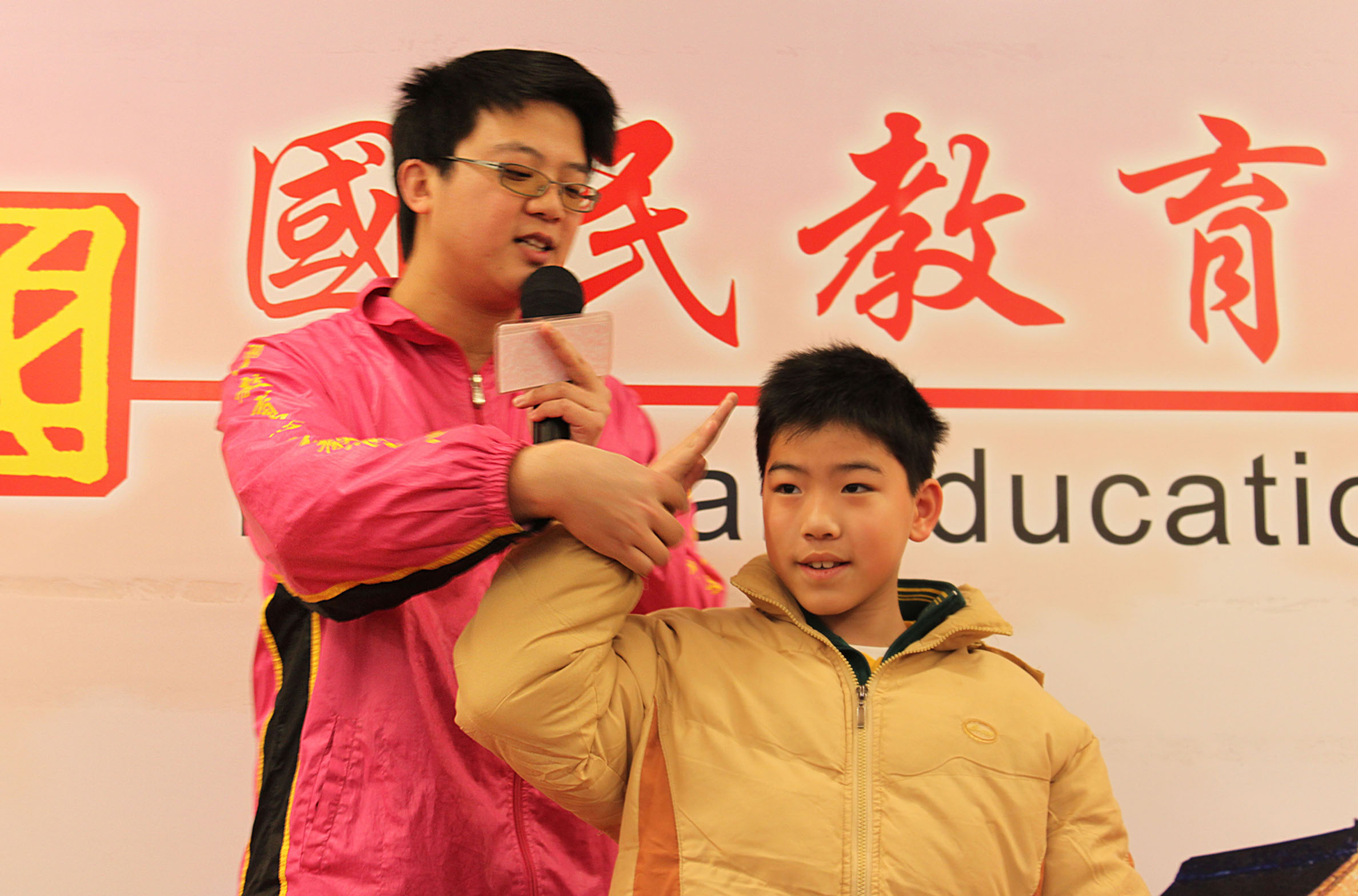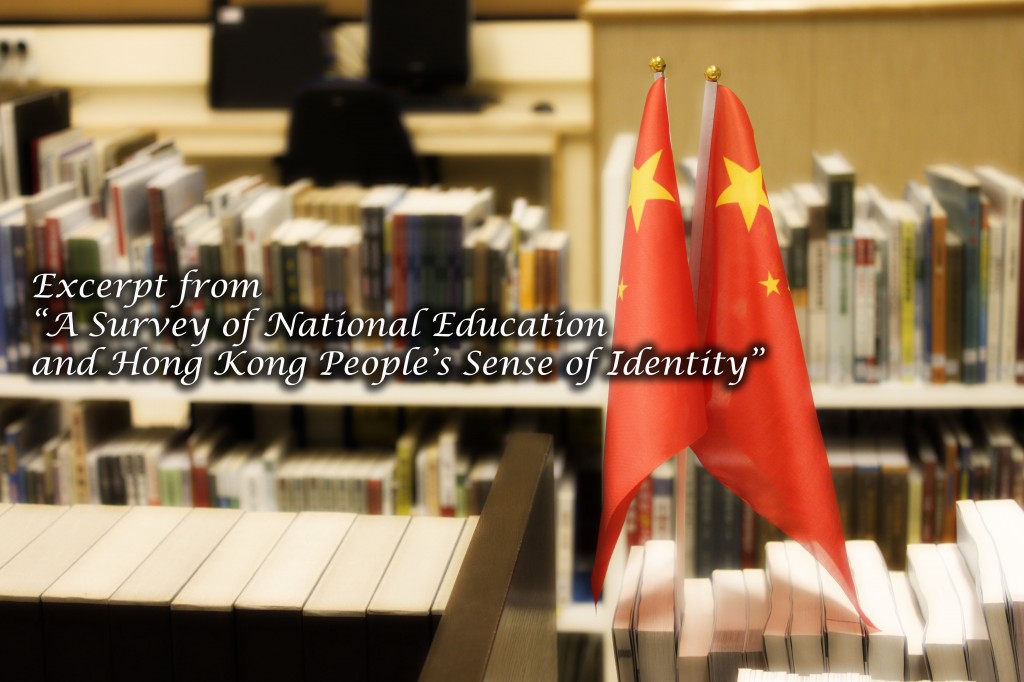How is the dominant one-sided national education in Hong Kong affecting students’ sense of Chinese identity?
Reporters: Dora Chiu and Joyce Lee
The primary students stand in straight lines and sing the national anthem. “Walk solemnly, stand firm, stay focused, and salute,” instructs their teacher as the school’s flag-raising team hoists the national flag.
Flag-raising ceremonies have become part of the routine at the Sheng Kung Hui Yautong Kei Hin Primary School. It is part of the national education this and other schools are conducting to promote a sense of national identity in Hong Kong’s young people. Most of the flag-raisers in the team have been receiving national education since they were in kindergarten.
According to a Varsity survey of 285 local university students who attended local schools for at least four years, 60 per cent of respondents first received national education before the age of 12. The poll showed 56 per cent of respondents regarded themselves as “Hong Kongers from China”, while 40 per cent said they were certain national education affected their national identity.
Eric Ma Kit-wai, a professor at the Chinese University of Hong Kong who has studied Hong Kong people’s sense of identity for over a decade, says the younger generation’s sense of national identity has increased significantly compared with only a slight increase among adults. He attributes this to the incorporation of national education in schools.
Yet, despite public discussions about national education, what “national” means is seldom clearly defined. The Chinese word guojia encompasses the concepts of country, nation and state. Where “country” is a geographical definition, “nation” denotes common ethnicity and culture, and “state” refers to a ruling power. When the word guojia is used interchangeably for these different meanings, these distinctions can become blurred, and people fail to realise that they can be discussed separately. Some scholars have noted that throughout Chinese history, the term guojia and other phrases with the character guo often implied the superiority of the state over everything else.
National education in Hong Kong also blurs the distinctions between country, nation and state. The two largest organisations providing national education materials in Hong Kong, the Hong Kong National Education Centre and the Hong Kong National Education Services Centre, focus mainly on China’s economic and technological development, as well as its history, arts, sports and geography. Politics is seldom discussed.
The two organisations were initiated by the pro-Beijing Hong Kong Federation of Education Workers and established with government support in 2004 and 2007 respectively. Ma says their governmental affiliation means it is unlikely they would cover the negative aspects of China or separate China from the ruling Chinese Communist Party.
However, Ma says it is important to define a country when conducting national education. This should be done through learning the history of how a country came to be what it is today, including the positive and the negative aspects of that process.
“A government would want to perpetuate its power by blurring the distinctions (of the different aspects of a country),” says Ma. “But a good national education would let students know that it is the people who vest power in a government. Therefore they have the responsibility to question what it does.”
Wong Chi-ming, director of the Hong Kong National Education Services Centre, says the ultimate purpose of national education is to encourage students to contribute to their country. He believes this is achieved through developing their sense of national identity by increasing their understanding of China. Wong says it is very important for students in Hong Kong to realise their identity as Chinese and to think as a Chinese.
This is also the mission of Hon Wah College, a school that has promoted national education since its establishment in 1945. Teachers raise the national flag and SAR flag every morning and students attend a flag-raising ceremony once a month.
All Hon Wah students are required to subscribe to the local pro-Beijing newspaper, Wenweipo. Principal Kwan Wing-bun says the school chooses the daily because it has the largest China coverage and carries many reports about China’s history, culture, society and technology.
The school’s national education has inculcated Jeffrey Lau Tsz-leung, a Form Two student, with a strong sense of national identity. Lau strongly identifies himself as “Chinese from China” and says he reads the Wenweipo although he knows it favours the central government.
But Lau’s classmate Alex Yung Wing-chun, feels differently. He is more comfortable identifying as a Hongkonger. Alex never reads the Wenweipo ordered by his school but prefers the Headline Daily and Yahoo news. He dislikes the strict control and severe corruption in Chinese society.
Wong Chi-ming admits the national education promoted by his centre mainly focuses on the positive aspects of China. However, he says negative aspects are also discussed. “Open a newspaper, and 90 per cent of the coverage on China is negative,” says Wong. “Ocassionally, there are one or two positive news stories such as the Chang’e rocket and the Olympics. But they only account for a small amount.”
Chinese University’s Eric Ma believes the media serves as a balance to the one-sided voice of mainstream national education. He says Hong Kong’s freedom of speech and diverse media means people have information about the negative and political aspects of China. Sensitive issues, such as the jailing of Nobel laureate Liu Xiaobo and tainted milk activist Zhao Lianhai can be freely discussed.
In Varsity’s survey, university students ranked the media as having the most influence on their sense of national identity, closely followed by teachers.
However, Mak Yin-ting, the chairperson of the Hong Kong Journalists’ Association (HKJA), questions the idea that the media should play a role in balancing uneven voices in the community. She says the role of media is to be positive about positive things and negative about negative things. “If they put more money into promoting a one-sided national education, is the media supposed to report more negative things? … It is ridiculous; it is not what the media’s supposed to do,” she says.
What is more, there are signs the media are becoming more “careful” in their coverage of China. In a survey conducted by the HKJA in 2007, 30 per cent of the journalists surveyed admitted they had practised self-censorship that year, and 40 per cent said they knew their colleagues or supervisor had practised self-censorship. This included downplaying issues and information unfavourable to the central government. Mak says the true amount of self-censorship is likely to be higher because not all respondents would admit to having practised it.
Mak attributes the rise in self-censorship to increasingly close commercial ties between media organisations and their owners to China. She says the moves by Beijing to appoint media owners and managers to the National People’s Congress or the Chinese People’s Political Consultative Conference are another factor.
Mak believes that national education should focus on producing civic citizens instead of national citizens and is critical of the way resources are being allocated in national education. “Why are they using public money to fund a one-sided dialogue to the public?” she says.
In this year’s budget, spending on Social Harmony and Civic Education, which involves funding for national education, has increased by 15 per cent from last year to HK$70 million. Meanwhile, the funding for Individual Rights, which involves educating the public about rights and equality, has decreased by 65 per cent to HK$15 million.
Leung Yan-wing, co-head of the Centre for Citizenship Education of the Hong Kong Institute of Education, says, although there are multiple approaches to national education in Hong Kong, there is a dominant mainstream. This mainstream promotes a positive discussion and is driven by the government.
“Institutes that aim at producing critical patriots are the weak sectors of the civil society – weak in the sense that they don’t have many resources,” says Leung. He explains that organisations with a positive approach such as the National Education Centre get more funding to produce visually attractive teaching materials and organise free exchange programmes. Those with a more critical approach can only produce unattractive teaching materials such as black and white booklets with few illustrations.
“You can imagine a teacher who already has many subjects to teach, and now he has to teach national education too… Naturally they would choose the highly supported package from the one-sided, mainstream national education,” Leung explains.
The dominance of the mainstream view of national education is not going unnoticed or unchallenged. In February, Ivan Lam Long-yin, a Form Five student at United Christian College (Kowloon East) founded the student activist group SchoolWILL on the social networking site Facebook. He wanted to provide a more casual platform for secondary school students to have political discussions, particularly on topics about national education and liberal studies.
Lam believes there is a lack of discussion in the national education he and his peers receive. He says teachers follow syllabuses and use course materials that are detached from current issues in China. “Without discussion, our understanding of our country can never keep up with changing events,” says Lam. He adds students cannot form their own opinions about the changes in society because without open discussion, they lack the analytic tools and will be constrained by their teachers’ ways of thinking.
Lam also disagrees with the government’s proposal to set up an individual subject of “Moral and National Education” in schools. He says this will encourage certain model points of views, and the space for discussion will further decrease.
“When we feel good about our country by only knowing about the good stuff like rocket launches or other big events, we support our country only because of the nationality written on our passports, and not because we truly understand what has happened to our country,” says Lam.
Lam says his feelings for China include feelings of sadness for the bad things that have happened and his sense of identity comes from his memories of Hong Kong. He says his connection to his friends and family here make it impossible to detach himself from his identity as a Hongkonger.
In the past, Lam did not consider himself a Chinese. Now he has a better understanding that China’s problems are due to its under-development and he feels a responsibility to help. “I don’t want to see Chinese people being bullied,” Lam says simply, “I am a Chinese.”
Leung Yan-wing from the Institute of Education says national identity is only a part of our multi-dimensional identity. He believes that before we belong to any country we are first part of the human race.
“We are all human,” says Leung. “National identity and cultural uniqueness should be discussed under the framework that we are all global citizens with fundamental human rights. We should be aware of this order to the point where sometimes we are able to let go of the concept of national interest for the betterment of mankind.”













































[…] from mainland China, Hong Kong's elementary schools have to start a new curriculum on “national education.” Recently revealed, its module on the “China model” is full of political […]
[…] from mainland China, Hong Kong's elementary schools have to start a new curriculum on “national education.” Recently revealed, its module on the “China model” is full of political […]
[…] from mainland China, Hong Kong’s elementary schools have to start a new curriculum on “national education.” Recently revealed, its module on the “China model” is full of political propaganda, such as […]
[…] And, before the current furore the Chinese University of Hong Kong had earlier engaged the question in 2011 – How is the dominant one-sided national education in Hong Kong affecting students’ sense of Chinese…? […]
I do understand that a citizen must love his/her country by understanding the policy which is using in that time. Seperating the national education is equal to betray the spirit of the National.